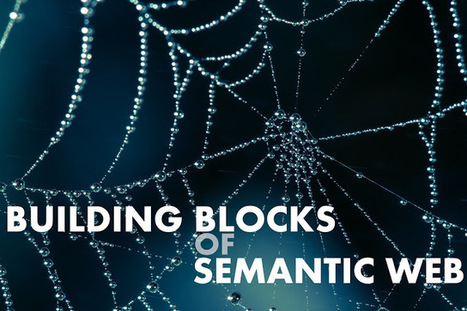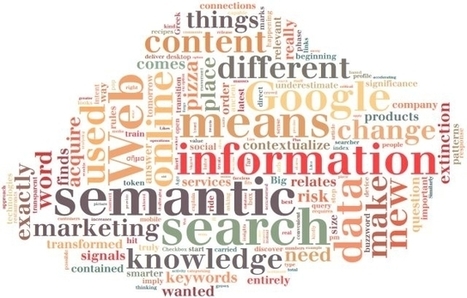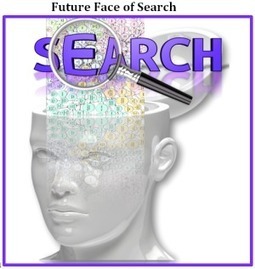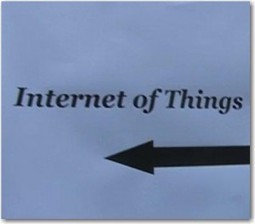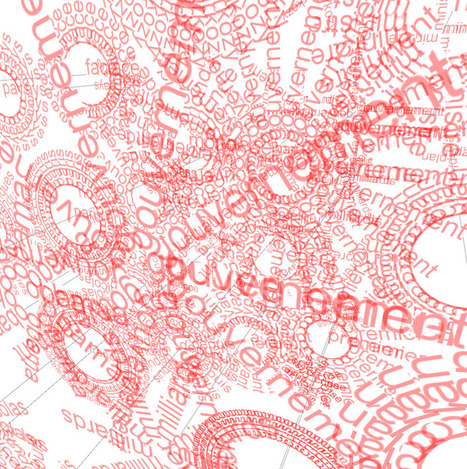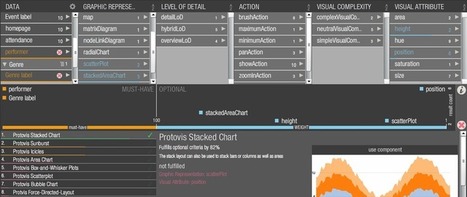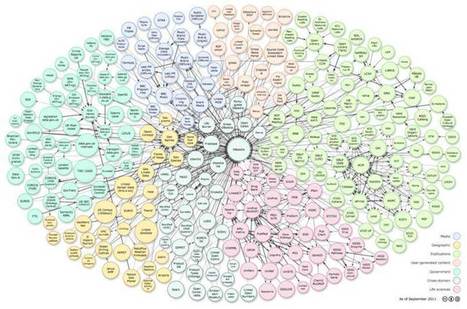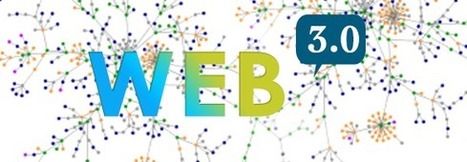 Your new post is loading...
 Your new post is loading...

|
Scooped by
Pierre Tran
|
There are two aspects to the possible future of the Web; one is that it is definitely going to be more social and more people-centric, but the other important characteristic is that it’s going to be more semantic in nature. The Web technologies that we have available today focus more on how pages are displayed and what content is displayed, rather than on the content itself. The semantic Web is a facet of technology that will allow this content to become meaningful for machines, and will enable them to process this content and help us share, combine and analyse content effectively.

|
Scooped by
Pierre Tran
|
Google Knowledge Graph Following its mission to provide more and more relevant search results and help its users to find what they’re looking for as quickly as possible, Google has built the Knowledge Graph. Launched in 2012, the Knowledge Graph is a big step towards creating a “semantic web” that understands its human users better …

|
Scooped by
Pierre Tran
|
The Internet is a moving target, constantly changing and evolving. As I contemplate its likely trajectory over the next 10 years, I hope whatever form it takes, it continues to exhibit the original values we established in its earliest years. These include the principles of ethics, trust, openness, free access, and shared content. However, I do fear and worry that we are already seeing trends toward certain governments controlling Internet access, conflicts between privacy and security, content and pricing control by a few large players, and more. DR. LEONARD KLEINROCK, 18/04/2014

|
Scooped by
Pierre Tran
|
Even before the interactive "Web 2.0" was established with its social networks such as Facebook and Twitter, ways had been conceived of making semantic links, in other words meaningful connections, visible in a "Web 3.0". But despite some promising attempts, fifteen years later the "Semantic Web" is still waiting for a breakthrough. The Alumniportal talks about this to Daniel Pfirrmann. Andreas Vierecke, 07/05/2014

|
Scooped by
Pierre Tran
|
Avec l'ouverture des données, la qualité du référencement est plus que jamais un passage obligé pour développer des services informationnels en ligne à forte valeur ajoutée. Si les techniques du « web sémantique » sont depuis longtemps identifiées comme une opportunité pour optimiser les accès aux contenus, elles sont encore souvent perçues, par un grand nombre de professionnels, comme un domaine complexe à appréhender autant qu'un terrain parfois difficile à pratiquer.
The "semantic Web" is hugely important to tomorrow's business. Do not underestimate its significance: It truly changes everything. Embrace it, or risk extinction. But what is it? And what does it mean for your business?
Via janlgordon

|
Scooped by
Pierre Tran
|
As the Internet of Things expands its reach, more and more of the everyday objects that we surround ourselves with are becoming “smart.” It’s already happening with our phones, our microwaves, our refrigerators, our lighting systems — entire houses are gaining an element of artificial intelligence, allowing us to communicate with objects via language. In most cases, those communications are as basic as possible, i.e. “Dim lights” or “Call Susan.” But with technologists and linguists putting their mental muscle to the test, we will soon find ourselves immersed in an array of objects, tools, and machine-based services that we will be able to converse with using natural language.

|
Scooped by
Pierre Tran
|
AstraZeneca Semantic Models expert Kerstin Forsberg gives insight into semantic web standards and what they can do for clinical research.

|
Scooped by
Pierre Tran
|
In a June 2010 Semantic Web Meetup in San Diego, Peter Mika of Yahoo!’s research division gave a presentation entitled, “The future face of Search is Semantic for Facebook, Google and Yahoo!

|
Scooped by
Pierre Tran
|
Someday you will be able to ask your browser or smart phone open questions like "Where should I take my wife for a good movie and dinner?" Your browser would consult its intelligence of what you and she like and dislike, take into account your current location, and then suggest the right movies and restaurants. If you are the first to deliver this, your startup might be the next Google!

|
Scooped by
Pierre Tran
|
The Internet of Things is coming, but it needs a semantic backbone to flourish. With some 25 billion devices expected to be connected to the Internet by 2015 and 50 billion by 2020, providing interoperability among the things on the IoT “is one of the most fundamental requirements to support object addressing, tracking, and discovery as well as information representation, storage, and exchange.”

|
Scooped by
Pierre Tran
|
Les 4 grands révolutions coperniciennes du web : 1. La dérive des continents documentaires à l'envers (constitution progressive d'une Pangée d'indexabilité) - 2. le capitalisme linguistique (Frédéric Kaplan) - 3. le changement d'axe de rotation du web...

|
Scooped by
Pierre Tran
|
Le web sémantique (généralement associé au terme « web 3.0 »), est une notion que l’on rencontre de plus en plus. Que désigne cette association des mots « web » et « sémantique » qui appartiennent tous deux à des disciplines relativement éloignées que sont l’informatique et la linguistique ? Le web du futur sera-t-il « intelligent » et capable de juger de la pertinence d’une réponse en analysant la sémantique de la question correspondante ? Nous offrira-t-il la possibilité d’exploiter l’ensemble des contenus du web de façon parfaitement pertinente et précise ?
|

|
Scooped by
Pierre Tran
|
The semantic web, or web 3.0, is often quoted as the next phase of the Internet. Led by the World Wide Web Consortium(W3C), the objective is to convert the current web of unstructured and semi-structured data into a “web of data”. According to W3C, with the semantic web it will be possible to easily share and re-use data across application, community and enterprise boundaries. Mark van Rijmenam, 04/06/2015

|
Scooped by
Pierre Tran
|
5th Web and philosophy conference@ESCWC 2015
May 31st 2015, Portoroz, Slovenia Call for paper The relationship between the Web and philosophy is now at a crucial turning point. While a group of philosophers and philosophically-influenced scholars are increasingly interested in the Web, we are facing unprecedented challenges around its future that requires concerted efforts between researcher and disciplines to be properly addressed.

|
Scooped by
Pierre Tran
|
It's hard to believe that just 25 years ago the idea of linking together databases so people could access information easily was limited to research universities and prescient sci-fi writers. With the advent of the worldwide web and HTML, databases came to the masses in the form of pages. Pages could be made up of images, text, video and even links with web pages linking to other web pages. We no longer needed a librarian to retrieve facts nor the skillset of a researcher to tap into bodies of knowledge. Jon Bakke, 13/05/2014

|
Scooped by
Pierre Tran
|
Understanding and interpreting Semantic Web data is almost impossible for lay-users as skills in Semantic Web technologies are required. Thus, information visualization (InfoVis) of this data has become a key enabler to address this problem. However, convenient solutions are missing as existing tools either do not support Semantic Web data or require users to have programming and visualization knowledge. We propose a novel approach towards a generic InfoVis workbench called VizBoard, which enables users to visualize arbitrary Semantic Web data without expert skills in Semantic Web technologies, programming, and visualization.

|
Scooped by
Pierre Tran
|
The focus on the semantic web was fun, but ultimately missed the big picture, which is people care not about knowledge graphs but about the people and current events happening in their social graphs.

|
Scooped by
Pierre Tran
|
In continuing the search for open data one cannot possibly overlook the W3C (the World Wide Web Consortium). In my opinion the W3C has had more impact on our information technology lives over the past 18+ years than any other open standards or open source entity. [...] Specific to open data, W3C continues to play a central, albeit heretofore relatively quiet, role; that quietude will soon change. Despite the hype around Apache Hadoop and related open source “big data” projects, if one considers the term “big data” from a wider context, all the way out to what I like to call the Data Economy, then W3C plays a more strategic role than Hadoop and its many cousins. Let’s explore further.

|
Scooped by
Pierre Tran
|
CHAPTER 1 The Semantic Way A path to becoming more perceptive, intelligent and collaborative Semantics is the study of meaning. Semantics organizes data into well-defined categories with clearly defined relationships. Classifying information in this way enables humans and machines to read, understand and infer knowledge based on its classification. Semantic technologies represent knowledge in a way that both people and computers can understand. They enable better access to accurate, timely and abundant information and the ability to easily structure the information into the logical and creative thought processes that drive intelligent activity.

|
Scooped by
Pierre Tran
|
An introduction to SemanticWeb and Linked Dataor how to link data andschemas on the weba W3C tutorial byFabien Gandon, http://fabien.info, @fabien_gandonIvan He

|
Scooped by
Pierre Tran
|
You’ve likely used terms on search engines that you thought should produce the information you’re looking for, only to be disappointed that the sites that show up couldn’t be farther from what you’re looking for.

|
Scooped by
Pierre Tran
|
Representing the Digital Enterprise Research Institute, Liam Ó Móráin , recently discussed the work of the DERI on the Semantic Web and the move from Web 2.0 to Web 3.0. Liam explains how the evolution of Web 2.0 to Web 3.0 (also known as Semantic Web) is taking the web experience to the user in a new and more powerful way. Web 3.0 will quickly and easily combine information from very diverse sources and serve the information to the user, based on intelligent browsing.

|
Scooped by
Pierre Tran
|
Imagine a world where the documents you retrieve from web sites have no links to any other document in any site. In terms of data on the Web today, this is where we are. Data on different sites are like silos and are not linked.

|
Scooped by
Pierre Tran
|
The adoption of Semantic Web technologies implies new challenges for user interaction beyond those already posed by Web technologies and interactive systems in general. HSWI workshop aims to explore and evaluate good practices in interface design, and ultimately feed into possible recommendations for standardizing and consolidating knowledge and good practices into a set of guidelines for semantic web developers, to ensure the usability and reasonably functional user experiences of the next generation of Semantic Web applications.
|
 Your new post is loading...
Your new post is loading...
 Your new post is loading...
Your new post is loading...










